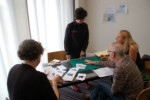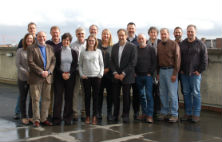Putting international collaboration to the test

Phase two of the Global Oiled Wildlife Response System (GOWRS) project recently kicked off in Belgium providing another two years in which to further the objective of developing and improving international cooperation and preparedness for oiled wildlife incidents.
The second phase aims to test the Standard Operating Procedure (SOP) that was developed during the first phase (2015-2016), e.g. via an exercise programme. Also readiness aspects of the system will be developed and opportunities will be created to increase awareness amongst end-users, in particular the oil industry project funders.
Oil spill exercises a key element of Phase 2
At its meeting in Ostend, the project team prepared the ground for future oil industry wildlife response exercises with their own internal table-top exercise, which was based on a fictitious scenario of an oiled wildlife incident in Malaysia. The exercise provided both a team-building opportunity for the 11 project partners and a test of some critical aspects of the SOP.
The exercise had a number of different components and started with an on-site briefing to a mobilised wildlife response team. The team was charged with developing a plan for a wildlife response facility as well as a wildlife capture plan. In this way, the exercise elaborated on the results of a recent exercise in which a GOWRS Assessment team was mobilized, and where some valuable real time data were collected, and further assessed during the exercise in Ostend.
Exercises such as these are essential to allow all those involved in the system, including potential end-users, to explore and better understand the capabilities and limitations of a tier-3 (international) wildlife response. In the end a tier-3 response is one that aims to complement and firm up a local (tier-1 or tier-2) response, but not to replace such a local response. Exploring what a tier-3 team can and cannot accomplish on its own via exercises will deepen the awareness of the need for development of local and national wildlife response resources and local systems trained on internationally agreed response standards.
Outreach to end-users
Education and outreach activities in the second phase project aims primarily at the end-users within the oil industry, the funders of the project (via Oil Spill Response Ltd.). To this end, the project is working with an Industry Advisory Group – which includes representatives from OSRL member companies. These individuals are serving as ‘confident ambassadors’ within their own companies, who can assist to pass on and promote the objectives of the project, and create opportunities for the GOWRS project partners to interact with these companies via, for example, integrated wildlife response exercises. As the system also aims to include other end-users such as the shipping industry and governments, the International Tanker Owners Pollution Federation (ITOPF) also participates in the Industry Advisory Group.

A focus on partnering
Developing a multi-organisational approach to Tier 3 wildlife response that consists of a large number of independent organisations needs a solid system of governance. To explore this, the project team participated in a one-day partnering workshop, facilitated by Ros Tennyson from the Partnership Brokers Association. This workshop was designed to allow the organisations involved in the project to explore each other’s priorities, expectations and contributions, as a foundation to building a shared vision for their ongoing international collaboration in the future.
The meeting in Ostend
The kick-off meeting took place from the 20th to 24th February in Ostend, Belgium, and was hosted at the Vayamundo Hotel by the Wildlife Rescue Centre of Ostend (WRCO) – one of the 11 GOWRS project partner organisations. The meeting concluded with a tour of the WRCO wildlife rehabilitation facility, which is located nearby on the Belgian coast.
Near future activities
Project partners hope to meet in-person for a second time later in 2017 but will continue their activities remotely in the interim. They will work on various readiness aspects such as the identification of response equipment, developing standards for qualifications and training. A paper on the achievements of the project and future implications will be presented at the International Oil Spill Conference in Long Beach, California this month.
